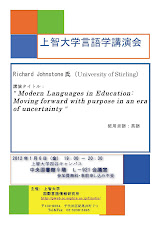上智大学言語学講演会
2012年1月6日(金)
19:00-20:30
於:上智大学 四谷キャンパス 中央図書館9階 L-921
参加費:無料(事前申込不要)
Richard Johnstone氏 (University of Stirling)
" Modern Languages in Education:
Moving forward with purpose in an era of uncertainty "
(使用言語:英語)
講演要旨
What we may now consider as conventional or traditional approaches to modern languages education has taken several different forms: e.g. grammar-translation; audio-lingual; audio-visual; communicative; language awareness. None of these have disappeared completely from the present scene, and indeed some of them (or aspects of some of them) still have their articulate adherents and continue to be implemented on a fairly wide scale, often within approaches that are pragmatic and not based on one particular pure ideology. Nonetheless, in many countries policy-related thinking for good reason has led to large-scale, systematic attempts innovate and to move beyond these traditional formats, through new curricular models such as the early learning of an additional language, or ELL; content-based instruction, or CBI, sometimes called content & language integrated learning, or CLIL; bilingual education; immersion.
Despite such strong thrusts of policy-led innovation, there remain many uncertainties of different sorts. These are in part a reflection of a) the global financial crisis which may put a strain on resources, opportunities and aspirations, b) the unpredictability of complex societal systems which may engender realities and problematical issues which even the best policies cannot anticipate, and c) interesting new ideas on what it might mean to be a proficient language-user, involving notions such as multicompetence and translanguaging.
Nonetheless, despite such uncertainties, there are lessons which may be learned from research and evaluation and which can lead to a worthwhile understanding of certain key conditions which need to be met, if a major initiative in modern languages education is to stand a good chance of being successful. The talk will conclude by offering some provisional thoughts on what these key conditions might be.
